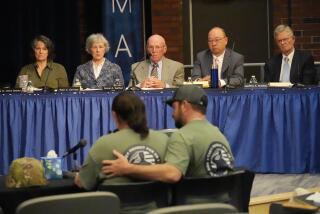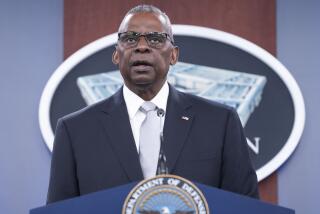Study on Cole Attack Finds Military Security Falls Short
- Share via
WASHINGTON — A high-level Pentagon study released Tuesday found that the bombing of the American destroyer Cole in October revealed dangerous shortcomings in U.S. military security and intelligence-gathering.
The report, which did not attempt to assess leadership performance in the attack, found that U.S. planes and ships remain highly vulnerable to terrorist attack as they shuttle American forces through dangerous regions. And it said that U.S. intelligence-gathering remains too focused on old, Cold War threats and needs to devote more attention to shadowy terrorist foes.
The Oct. 12 attack, which occurred while the guided-missile destroyer was refueling in the port of Aden, Yemen, revealed “a seam in the fabric of our efforts to protect our forces,” the report said. Seventeen U.S. sailors were killed and 39 injured when a huge bomb carried on a small boat blasted a hole in the vessel at midships.
Despite the study’s conclusions, it remains unclear whether any U.S. official will be found at fault for what happened to the $1-billion destroyer.
Retired Navy Adm. Harold W. Gehman Jr. and retired Army Gen. William W. Crouch, who headed the study panel, named no individuals, organizations or foreign nations in their report. Their job was not to seek blame but to look for ways to “improve the processes,” Crouch said.
And, so far, the Navy chain of command has rejected the idea of attaching any culpability to the Cole’s skipper, Cmdr. Kirk S. Lippold, or to the ship’s crew. Though an investigative officer found that the crew failed to follow dozens of required security procedures on the day of the attack, senior Navy officers have declined to assign blame, arguing that none of the precautions would have averted the blast.
Defense Secretary William S. Cohen on Tuesday formally asked the military’s top officer, Joint Chiefs Chairman Henry H. Shelton, to look again at whether anyone in the military chain of command deserves blame in the incident.
Shelton will not gather facts in a new investigation, but rather will review the evidence accumulated so far to assess whether anyone in the chain, including regional military commanders, was negligent, Cohen said. Shelton will review the report “to see if it raises any accountability issues that should be pursued further,” Cohen said.
Asked whether he had any concerns that the public might decide the Pentagon had conducted a “whitewash,” Cohen said he had reached no conclusions on the issue. He said he expects to receive Shelton’s review before he leaves office in 10 days.
The report, a 10-page unclassified version of a 138-page classified document, was written in broad generalities, avoiding specifics that might tip off enemies on what security measures the United States could use against them, officials said. The report generally praised the force-protection program the Pentagon has in place, but said the efforts remain inadequate in the face of clever adversaries.
Regional commanders abroad should be given full-time specialists in force protection, the report said. It also urged more force-protection training for American troops and said that military officers should be better trained in what kinds of intelligence to request when operating abroad.
The report said that intelligence agencies need to work harder at developing human sources of information in high-risk areas, in addition to technical sources such as electronic intercepts.
And the government should streamline the processes that now make it hard for foreign nations to help protect U.S. forces traveling through their territory, the report said.
The Pentagon has been increasing force-protection measures for years, especially since the 1996 bombing of an Air Force barracks in Dhahran, Saudi Arabia, that killed 19 Americans.
American troops deployed in the Middle East and the Balkans are under orders to travel only in groups and be heavily armed, steps that have sometimes provoked ridicule from soldiers of European allies.
Yet with anti-U.S. fervor strong in the developing world, even these measures have sometimes not been enough, officials said.
“Even America’s best efforts cannot remove every risk” in the face of “a very adaptive, persistent, patient and tenacious terrorist,” Cohen said.
More to Read
Sign up for Essential California
The most important California stories and recommendations in your inbox every morning.
You may occasionally receive promotional content from the Los Angeles Times.














